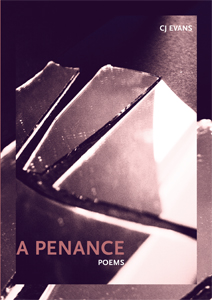Book Review
CJ Evans’s A Penance is a collection consistent in what Henry James calls the writer’s donnée—the subject and idea that all critics must grant the artist. The speakers of the poems working within this framework are more than confident of their surroundings: a fractured, contemporary world. Many of the poem titles—“Instructions for Silk,” “Black Today,” “Among the Rocks the Garden,” “From Nowhere, with Love,” “I Know the Pinecones,” “This Time in Wartime,” “Trespass,” “Rumor in the Orchard”— bring the reader to the conclusion that this book concerns itself with the day’s own difficulties. The speakers acknowledge the condition of the present and, as with Wallace Stevens, this awareness is without “mythmaking.” By this word I refer to Stevens’s understanding of the world as secular, a place without the beliefs or myths of the past. A poem that speaks to this understanding is “Churchbells Rung by an Earthquake.”
It begins:
I’ve neglected the mystery
of oysters, as I have grasshoppers
and ends:
but the letter inside remains
inside. And huge seagulls
watch me from the rocks,
daring me to make a move.
The conflict here arises from the speaker’s separation from everything that his world offers: religion, the natural world, and the city. Simple enough—this is familiar post-postmodern territory. The speaker’s affirmative contentment, though, is what makes this poem, and others in the collection, unique. Here is a speaker who has willingly let go of the world in a way that only continued “neglect” can allow. As the title indicates, “churchbells” that once signaled prayer hours are now “rung by an earthquake”—in essence, the speaker inhabits a world without mystery. The irony that this poem introduces is one that only a speaker like this could: “I’d like to be reintroduced / to the taste of mint,” as if desire could warrant the world’s obedient delivery.
The poems in Evans’s collection move beyond the absurdity that a reader might expect with familiar settings and dichotomies to introduce a voice that recognizes the conditions that the world of the poem has presented: a world that simply is. The world as a thing that the speakers find themselves in is precisely the idea of the work inside A Penance. Lines such as, “I like to think they’re cruel / because of the world’s design” from “I Know the Pinecones” are reminiscent of Wallace Stevens only in terms of phrasing. Near the end of the poem one reads:
. . . the knives
in their hands the fault
of an Earth that lets its bones
be bent into these cruel devices.
The intrusion of the speaker into the poem to assert an idea is not reminiscent of what most readers find valuable in Stevens’s work (namely his ability to let objects in the poem present themselves; to become, as he says, “objects of insight”). But to say that Evans fails at matching Stevens’s presentation of objects and ideas is really of no consequence—really, nobody ever does. In nearly every poem Evans presents a speaker who names the images of the world and, in observing their actions, illustrates the central conflicts of our contemporary condition: environment, war, love, and violence.
“What if all this / is just a false summit? What if” the speaker of “Among the Rocks the Garden” asks near the end of the poem. One characteristic of valuable literature is this kind of skeptical inquiry. The reader enters the world through the speaker’s perspective, but we are asked to do more than take in the objects as merely poetic or beautiful. The objects taken together with the speaker as a world of existence, not just as a contrast to the speaker, make for a reality that is dynamic, never asserting a particular truth. In the poetry that is valued most today (that is, if any poetry can be said to be “valued most”), readers often get a contemporary confessionalism which, behind all of its tropes and ornament, is just a recycling of past confessions: a speaker obsessed with himself who uses everything outside of himself as a foil rather than as a part of the world. Truth for the confessional poet is always inward; all acknowledgements lead back to or compliment the self.
Evans’s A Penance, though not perfect, challenges readers in a way that requires them to continuously re-read the text in order to plunge the depths that he has constructed. This collection should be required reading for anybody interested in contemporary poetry, especially if a reader has become disillusioned by the overbearing “I” or the gilded forms of surface experimentalisms that grow dull after one reading.
About the Reviewer
Daniel M. Mendoza’s work has appeared in Pleiades: A Journal of New Writing and is forthcoming in Texas Review, Book Review. He currently lives in the Texas Rio Grande Valley.
